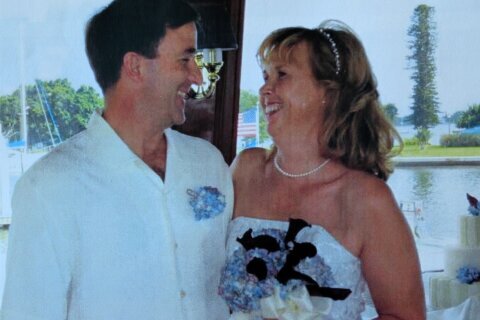The Virginia man convicted of brutally raping two lifeguards in Alexandria and Fairfax County at gunpoint was sentenced Friday to 65 years in prison.
Prosecutors had asked the judge to sentence 39-year-old Jesse Bjerke to 80 years behind bars, saying he should never walk the streets again and calling him “the monster we think is lurking behind every corner.”
During the sentencing hearing in Alexandria Circuit Court, one of the women Bjerke raped addressed the court by video conference, calling the day of her rape the “last known day in my life.”
Bjerke’s attorney had requested a sentence of “a couple of decades” and the “low end of the guidelines” as a fair sentence for his client.
Bjerke himself also addressed the court, apologizing for the “pain and suffering that I, alone, am responsible for,” and saying, “I am sickened by what I’ve done.”
Before delivering her sentence, Judge Lisa Kemler said Bjerke’s crimes were not acts of impulse but were carefully plotted and planned.
“This was two sets of horrible, brutal crimes,” she said. “You spent time thinking about and planning to commit rape — twice. This was awful, hideous behavior, and you chose not to seek help.”
Investigators had been at a yearslong dead-end in the case of a woman who was raped at a deserted Alexandria swimming pool over the Labor Day weekend in 2016, when they ran the suspect’s DNA through public genealogical databases, which pointed to Bjerke as a suspect.
Bjerke eventually pleaded guilty in October 2019 to six felonies, including rape and abduction with intent to defile.
Earlier this year, he pleaded no contest and was convicted of the rape of another woman, who was working as a lifeguard in Fairfax County when she was attacked in August 2014.
Victim: ‘I thought the worst thing was to die’
The woman Bjerke raped at the Alexandria pool gave a victim impact statement by video from her home in Bulgaria. She was in the U.S. in 2016 for the summer to make some money during a break from medical school.
The woman, who was 24 at the time, said she was a “dreamer” before she was attacked.
“Now, I don’t believe in anything,” she said. “It was the last known day in my life. I will never forget those words: ‘I’m going to rape you, kill you or both.'”
Bjerke had approached the lifeguard and told her he had left his flip-flops at the pool the day before. She was helping him search for them in a secluded pump room where lost-and-found items were stored when he pulled a gun on a her.
“I thought the worst thing was to die,” the woman told the judge. “It was not. It is (worse) to live with this.”
She said although she remains fearful and will always be traumatized, she is now a doctor.
The woman in the 2014 rape did not give a statement during the sentencing hearing but submitted a written statement, which prosecutors read.
“I don’t think of myself as a victim. I’m a survivor,” the woman wrote.
Unlike the other case, this woman was drugged during the attack with ketamine, although details of how that happened were not explained. At the time, Bjerke was an EMT and had stolen the drug to use in the attack, prosecutors said.
Alexandria Senior Assistant Commonwealth’s Attorney Jessica Smith said even though stranger-on-stranger sex assaults are extremely rare, “every woman in this courtroom has looked over their shoulder” when they find themselves alone.
Referring to Bjerke, Smith said, “He is the monster we think is lurking around every corner.”
Smith, who prosecuted the case with Fairfax County Deputy Commonwealth’s Attorney Jessica Edwardson, described the steps Bjerke took to plan the attacks: “He bought zip ties, he found pools that were remote, waited for bad weather, had latex gloves, guns, ketamine. This was not a crime of impulse.”
Referring to prosecutors’ request for an 80-year sentence, she added, “A woman should be able to sit in that lifeguard chair for the next 80 years feeling safe, knowing Jesse Bjerke is behind bars.”
Tearful apology
In the defense’s closing argument, attorney Christopher Leibig disagreed with the prosecution’s painting of Bjerke as “true evil.”
He pointed to the fact that after his arrest for the 2016 Alexandria rape, Bjerke told prosecutors he also wanted to plead guilty to the earlier Fairfax County rape, which at the time was still unsolved.
Testifying for the defense, Bjerke’s sister said her brother was devastated by the breakup of his first marriage after she said his wife cheated on him.
After the birth of his daughter with his current wife, “they were elated,” she testified.
She said she remembers seeing her brother holding the baby, and he was very emotional.
“He was smiling through his tears,” she said. Later, after his arrest in 2019 for the Alexandria rape, she said she came to believe “those tears were of what he had done in 2016.”
She said Bjerke remains active in his daughter’s life, reading her bedtime stories from prison once a week.
During his sister’s testimony, Bjerke cried quietly behind a black cloth mask.
The defense also called Leslie Martin, a licensed clinical social worker and expert in sexual disorders, who said that after his arrest, Bjerke contacted her.
“He wanted to learn how he became an offender,” Martin said.
So far, in 11 video sessions, she said he is very involved, trying to understand what brought him to this point. Bjerke told her he’d been sexually assaulted as an 8-year-old by a family friend and was exposed to pornography around the same time.
“That led to some negative fantasies being reinforced, combined with his depression,” Martin said.
In addition, she said Bjerke had recurrent fantasies since his 20s involving the Japanese animation-style, known as anime, that involved a “monster taking control” and “overpowering someone,” Martin said. She said he told her he had never shared those thoughts with anyone.
In addressing the court, Bjerke spoke from behind his mask and periodically dabbed at his eyes with a tissue.
“I don’t have the words to describe how deeply sorry I am,” he said.
He also apologized to his family and friends. “I lied to them, saying I was innocent when I was not.”
The sentencing guidelines in the case, for someone with Bjerke’s lack of criminal past, was 29 to 46 years. But the judge said “these cases cry out” for a more severe sentence.
WTOP’s Jack Moore contributed to this report.








